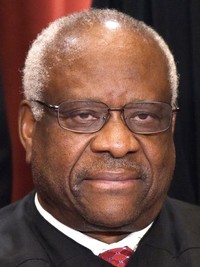Clarence Thomas

Clarence Thomas was born in Pin Point, Ga., on June 23, 1948. He had a tough childhood, with his father leaving the family early in his life. When Thomas was 9 years old, he and his brother were sent to live in Savannah with his mother's father and stepmother. Thomas' grandfather encouraged him to pursue a religious life, and he took the first step in that direction during high school when he transferred to St. John Vianney Minor Seminary. After graduating in 1967, he continued his studies at Missouri's Immaculate Conception Seminary. Things changed for Thomas in 1968 following the assassination of Martin Luther King Jr., an event that turned out to be a turning point for him. He left the seminary and went to College of the Holy Cross in Massachusetts, where he studied English. While there, he became active in social causes, which included protesting the Vietnam War, campaigning for civil rights, and establishing a black student union. Thomas later attended Yale University Law School, where he received a J.D. in 1974. After earning his degree, Thomas went to work as an assistant to Missouri Attorney General John Danforth. When Danforth was elected to the U.S. Senate in 1976, Thomas became an attorney for the Monsanto Chemical Company. After his time with Monsanto, Thomas moved to Washington, D.C., and worked for Danforth again, this time as a legislative assistant handling energy issues for the Senate Commerce Committee. He joined the Reagan administration in 1981, becoming chairman of the Equal Employment Opportunity Commission a year later, a position he held until 1990. On Oct. 30, 1989, President George H. W. Bush nominated Thomas for a seat on the U.S. Court of Appeals for the District of Columbia Circuit. Despite initial protestations to his nomination, Thomas was confirmed on March 6, 1990. When Supreme Court Justice Thurgood Marshall retired in 1991, Bush tabbed Thomas to fill Marshall's seat on the court. Thomas endured a contentious confirmation process, highlighted by testimony from former Marshall assistant Anita Hill, who accused him of having sexually harassed her - including asking her out and making inappropriate remarks about her body -- when they worked together. Thomas denied the allegations, and the confirmation committee ultimately decided that there was not enough evidence for Hill to prove her claims. Thomas was eventually confirmed in the Senate, by a slim margin of 52-48. He tended to side with his fellow conservatives on the court, including on cases related to affirmative action and same-sex marriage. Thomas doesn't give many interviews, but he disclosed information about himself in 2007 when he published his memoir, "My Grandfather's Son," which made it to No. 1 on the New York Times' nonfiction best-seller list upon its release.